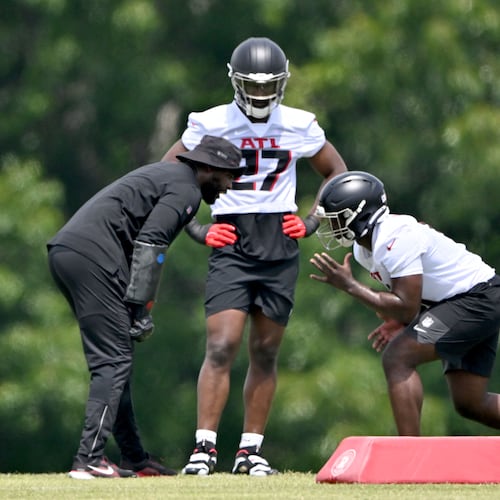FLOWERY BRANCH — Matt Ryan will be judged, in part, by playoff wins.
Right now, the Falcons quarterback is 0-for-2.
There is inescapable scrutiny that comes with the failure to advance in the NFL postseason, especially for the leader of the offense. Call it pressure. Call it heat. Call it over-analysis. It’s there. Remember Steve Young imploring “someone take the monkey off my back, please,” in the final seconds of the 49ers’ Super Bowl XXIX victory?
Eli Manning can relate to Ryan. The Giants quarterback lost his first two playoff games and faced questions in New York on whether he could win when it mattered most. Manning answered when he led the Giants to four consecutive postseason wins en route to the Super Bowl XLII MVP following the 2007 season.
“It wasn’t pretty,” said ESPN NFL analyst Tim Hasselbeck, who backed up Manning for two seasons. “If you took a poll after the [first playoff loss] the city would have said he was horrible. The fallout from that second playoff game was, is this guy a bust?
“What impressed me was you would have never known it. Even if his dog died, you would have never known. He really did an exceptional job of just focusing on football and the things he could control.”
The Falcons play the Giants on Sunday in the opening round of the playoffs. It’s the third postseason trip in four seasons for Ryan and another opportunity to quiet his critics.
“I know that we’ve had two postseason games prior to this,” Falcons coach Mike Smith said. “We haven’t got the outcome we wanted. We are learning from those experiences. We’re going to use those as growing experiences and we’re looking forward to competing this week, and that’s just not Matt Ryan. That’s Mike Smith, every member of our team.”
Ryan is a combined 46-of-69 for 385 yards in playoff losses to the Cardinals (30-24) and Packers (48-21). He threw for three touchdowns with four interceptions.
Manning was a combined 26-of-45 for 274 yards in his first two playoff appearances, losses to the Panthers (23-0) and Eagles (23-20). He threw two touchdowns with four interceptions. Since the Super Bowl title, the Giants have made the playoffs once, losing to the Eagles (23-11) in 2008. That puts Manning’s playoff record at 4-3.
Concern with playoff victories can cloud the big picture of Ryan’s accomplishments in his four seasons, according to former Falcons coach Dan Reeves.
“Until it happens, people are going to say things,” Reeves said. “They don’t look at his overall record and all the things he’s done to put his team in that position. Look around the league, there aren’t many better. He doesn’t have to apologize to anyone. But until they win, it’s going to affect how he’s known.”
Ryan and Manning have put together similar seasons statistically. Both have thrown for more than 4,000 yards, have completion percentages over 60 and completed 29 touchdown passes.
Ryan, 26, led the Falcons to a 10-6 record and the fifth seed as a wild-card team. He directed fourth-quarter comebacks three times, twice against the Panthers and once against the Eagles. Manning, 31, led the Giants to a 9-7 record and the fourth seed by winning the NFC East. He led five fourth-quarter comebacks, against the Eagles, Cardinals, Dolphins, Patriots and Cowboys. He also was credited with another game-winning drive against the Bills.
Their shared football intelligence and intangibles, not necessarily their physical abilities, are what make each quarterback special, according to Hasselbeck.
“If you look around the league, take a guy like Matthew Stafford and he is much more gifted physically than either Eli or Matt in terms of arm strength and such,” Hasselbeck said.
“It won’t be hard to find 10 guys better physically. They are not the hardest throwers, but they anticipate really well, they are smart and their teams ask a lot of them at the line of scrimmage. ... When things are flying around they can see it, process it and digest it. That’s more important than having a cannon for an arm.”
The two are even similar in stature. Ryan, the No. 3 overall draft pick in 2008, and Manning, the No. 1 pick in 2004, are both are 6-foot-4. Manning is listed a pound heavier at 218.
Reeves and Hasselbeck both explained the quarterbacks are similar in their pocket presence and that their intelligence also allows added complexities to the offenses and success in no-huddle situations.
“Both of them are outstanding quarterbacks that give their team a chance to win every time they step on the field,” Reeves said. “They both have big-time receivers and they know how to get the ball in their hands. They both have good running backs, which they love to have.”
About the Author
Keep Reading
The Latest
Featured


